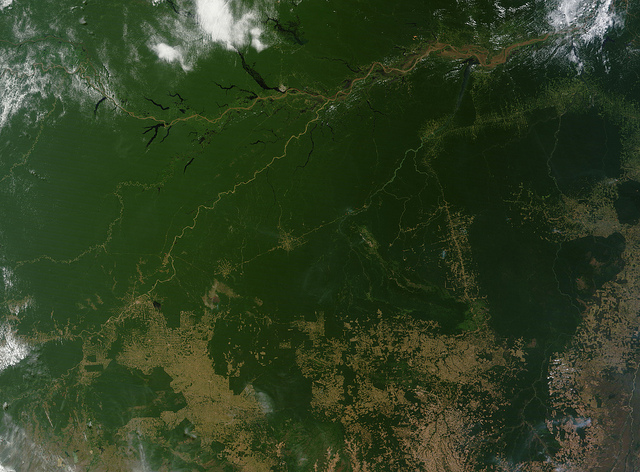
Date: 2025-01-02 Page is: DBtxt003.php txt00009360
Issue
Deforestation
Our Planet's Lungs Are Dying
Burgess COMMENTARY
Peter Burgess
Our Planet's Lungs Are Dying

31 July, 2011- Satellite photo of the Amazon Rainforest. (Photo: NASA Goddard Space Flight Center)
Trees are like our planet's lungs.
Every second of every day, they're absorbing CO2 from the atmosphere, and converting it into energy.
In fact, according to a study by researchers at NASA, each year, tropical rainforests absorb a staggering 1.4 billion metric tons of CO2 from Earth's atmosphere.
Through the process of photosynthesis, they're 'inhaling' that CO2, and keeping it from further damaging our planet and speeding up the process of climate change.
See more news and opinion from Thom Hartmann at Truthout here.
Photosynthesis is a process used by trees and other plants to convert sunlight into chemical energy that can be used later as fuel. During photosynthesis, plants absorb CO2, which is combined with water - H2O - to produce a mixture of carbon, oxygen and hydrogen called 'carbohydrates' - everything from roots to stems to leaves and fruits.
And by absorbing and binding the carbon in carbon dioxide that way, our planet's tropical rainforests are an invaluable line of defense in the fight against global warming and climate change.
But unfortunately, new studies are showing that that defense is weakening.
Our planet's lungs are dying.
For the first time in history, scientists have been able to determine the rate at which trees in the Amazon rainforest can absorb carbon during periods of drought.
Scientists have known for a while that a drought can impact an individual tree's ability to 'inhale' carbon, but now, we know just how big that impact is.
Researchers looked at the growth and photosynthesis rates of trees in 13 different Amazon rainforest locations throughout Brazil, Peru and Bolivia.
Some of those locations were affected by a severe drought in 2010 and some weren't.
The researchers found that trees in areas that were affected by the 2010 drought had much lower photosynthesis rates than trees in areas that were not. And, they were also in poorer overall health than their drought-free companions.
Speaking about this groundbreaking study, Christopher Doughty, one of the researchers, said that, 'Tropical rainforests have been popularly thought of as the 'lungs' of the planet. Here, we show for the first time that during severe drought, the rate at which they 'inhale' carbon through photosynthesis can decrease.'
Doughty went on to say that, 'This decreased uptake of carbon does not decrease growth rates but does mean an increase in tree deaths. As trees die and decompose, the concentrations of carbon dioxide in the atmosphere will increase, potentially speeding up climate change during tropical droughts.'
And thanks in large part to those droughts, our tropical rainforests are disappearing at an alarming rate, again reducing their ability to absorb CO2 and slow down climate change and global warming.
In a study published in the journal Geophysical Research Letters, researchers point out that during the 1990s and 2000s, the loss of tropical rainforests globally increased by a whopping 62 percent.
There are a lot of factors behind the loss of our rainforests, from drought to deforestation and urbanization - the common denominator is that all are caused or made worse by human activity.
Between 2000 and 2010 alone, the net tropical rainforest loss rate was 6.5 million hectares per year.
To put that in perspective, that's the equivalent of clearing out a piece of land the size of West Virginia EVERY YEAR.
That's a lot of trees and a lot of carbon-absorbing power being wiped out each year.
Tropical rainforests, and really all forests, play a huge role in the fight against climate change and global warming.
But, as more and more tropical rainforests are wiped out, from natural causes like drought or manmade causes like deforestation, we're losing a key ally in the climate change fight.
When it comes to the fight against global warming and climate change, we're in the fight of our lives, and we need all the help that we can get.
We need to start protecting our planet's forests, so that they can in turn protect us.
Save the rainforest, save the planet.
This article was first published on Truthout and any reprint or reproduction on any other website must acknowledge Truthout as the original site of publication.